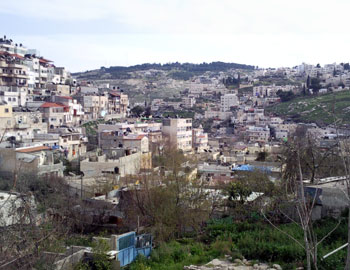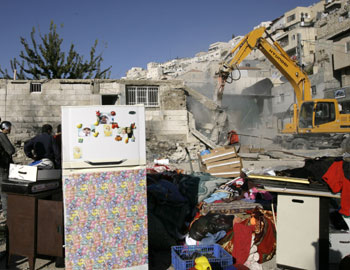On 21 June 2010, the Jerusalem Municipality’s Planning and Building Committee approved the municipality’s plan to demolish 22 houses in al-Bustan, a neighborhood in the center of Silwan in East Jerusalem. In recent years, the Municipality has been advancing a plan to build an archeological garden in the neighborhood. The plan calls for the demolition of a sizeable percentage of the houses in al-Bustan. The Municipality refused to discuss with the residents an alternative plan they proposed. The Municipality’s plan requires the approval of the District Planning and Building Committee, in the Ministry of the Interior.

Al-Bustan, in Silwan. Photo: Noam Preiss, B'Tselem, 19 March 2009.
According to the plan, one-quarter of the houses in al-Bustan (22 of the 88 houses) will be demolished and an archeological garden will be built on the land. The Municipality proposes that the residents of the houses slated for demolition should move to another area in the neighborhood, and promises to approve retroactively the other houses, which were built without permits. However, the Municipality does not own the land in these other sections, so it has no authority or ability to make this offer to the residents. The families will have to purchase land and build their houses after the Municipality demolishes their property. Even if they manage to buy the land, there is no guarantee they will be able to build there. The substantial prerequisites for obtaining building permits that the Municipality places on East Jerusalem residents regarding proof of ownership and installation of the requisite infrastructure effectively prevent lawful Palestinian construction in East Jerusalem.
One thousand persons live in al-Bustan. Most of the houses were built in the 1980s and 1990s. A few were built prior to Israel’s annexation of East Jerusalem in 1967. In November 2004, the Municipality began to promote a plan for an archeological garden, known as “The King’s Valley,” which will surround the Old City. The city engineer, Uri Shetrit, ordered the demolition of all the houses in the neighborhood in order to increase the area of the archeological garden. In early 2005, the Municipality began to carry out the directive. Residents of the neighborhood began to receive demolition orders and indictments were filed against them for building without a permit. At the time, the Municipality demolished two houses in al-Bustan. Currently, orders to demolish 43 structures remain in force.

The Jerusalem Municipality demolishes a family’s house in al-Bustan, in Silwan, 5 November 2008. Photo: Yanis Bakarqis, Reuters.
Local residents requested the attorney general to prevent the destruction of the neighborhood. Also, international pressure was brought to cancel the plan. Subsequently, Mayor Uri Lupoliansky stated in 2005 that he had retracted the plan and that the residents would be allowed to propose a plan that meets their development needs. In August 2008, the residents presented their plan. The city engineer, Shlomo Eshkol, informed them that the plan would not be considered in the immediate future, and that the Municipality was proceeding with the plan to build an archeological garden on the site.
The Municipality’s outline plan for the Old City, drafted in 1977, marked the existing structures in al-Bustan, although the neighborhood was classified as open space. Although more than thirty years have passed since then, the Municipality has refused to issue building permits or approve existing construction, except in isolated cases. Choking development of the neighborhood is a typical example of the Municipality’s planning and building policy in East Jerusalem since 1967.
This policy is especially problematic in that, in Silwan, plans are being advanced to develop the compound run by the settler non-profit societies Elad and Ateret Cohanim, and build the City of David National Garden, operated by Elad, which is being constructed between Palestinian houses surrounding al-Bustan. In addition, these societies are building institutions and parking lots, and archeological excavations are taking place close to Palestinian houses in Silwan. Also, the Municipality has refrained from sealing a seven-story structure that Ateret Cohanim built in Silwan without a permit.
The plan to demolish houses in al-Bustan denies its residents the right to housing, which is derived from the right to an adequate standard of living as defined in the International Covenant on Economic, Social and Cultural Rights. In addition, the Fourth Geneva Convention prohibits the occupying state to destroy the property of residents of occupied territory, who benefit from the status of protected persons, “except where such destruction is rendered absolutely necessary by military actions.” The Convention further states that “extensive destruction and appropriation of property not justified by military necessity and carried out unlawfully and wantonly” constitute a grave breach of the Conventio
هیچ نظری موجود نیست:
ارسال یک نظر